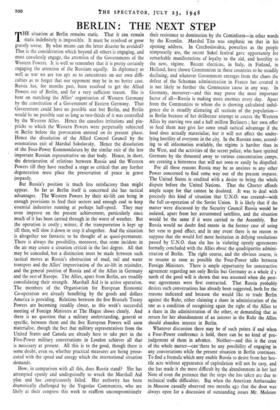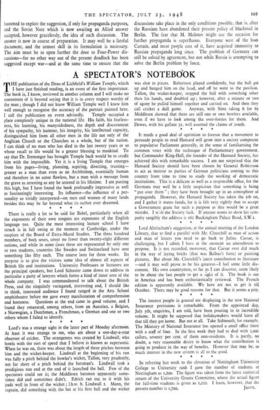BERLIN : THE NEXT STEP
HE situation at Berlin remains static. That it can remain T static indefinitely is impossible. It must be resolved or grow gravely worse. By what means can the latter disaster be avoided? That is the consideration which beyond all others is engaging, and must ceaselessly engage, the attention of the Governments of the Western Powers. It is well to remember that it is pretty certainly engaging the attention of the Russians equally. In diplomacy as well as war we are too apt so to concentrate on our own diffi- culties as to forget that our opponent may be in no better case. Russia has, for months past, been resolved to get the Allied Powers out of Berlin, and for a very sufficient reason. She is bent on matching the Allies' organisation of Western Germany by the constitution of a Government of Eastern Germany. That Government could have no possible seat but Berlin, and Berlin would be no possible seat so long as two-thirds of it was controlled by the Western Allies. Hence the ceaseless irritations and pin- pricks to which the Western Powers were perpetually subjected in Berlin before the provocation entered on its present phase. Hence the dissolution of the Allied Control Council by the ostentatious exit of Marshal Sokolovsky. Hence the dissolution of the Four-Power Kommandatura by the similar exit of the less important Russian representative on that body. Hence, in short, the deterioration of relations between Russia and the Western Powers till they have reached a stage so critical that any further degeneration must place the preservation of peace in grave jeopardy.
But Russia's position is much less satisfactory than might appear. So far as Berlin itself is concerned she has tactical advantages. The Western Powers by their air-lift can bring in enough provisions to feed their sectors and enough coal to keep essential industries running at perhaps half-speed. They may even improve on the present achievement, particularly since much of it has been carried through in the worst of weather. But the operation is costly ; winter, if the transportation is kept up till then, will slow it down or stop it altogether. And the situation is altogether too fantastic to be thought of as quasi-permanent. There is always the possibility, moreover, that some incident in the air may create a situation critical in the last degree. All that may be conceded, but a distinction must be made between such tactical moves as Russia's obstruction of road, rail and water transport and the Allies' improvisation of the air-lift in rejoinder, and the general position of Russia and of the Allies in Germany and the rest of Europe. The Allies, apart from Berlin, are steadily consolidating their strength. Marshall Aid is in active operation. The members of the Organisation for European Economic Co-operation are already benefiting by the goods and dollars America is providing. Relations between the five Brussels Treaty Powers are becoming steadily closer, as this week's successful meeting of Foreign Ministers at The Hague shows clearly. And there is no question. that a military understanding, general or specific, between them and the five European Powers will soon materialise, though the fact that military representatives from the United States and Canada are already here to take part in the Five-Power military conversations in London achieves all that is necessary at present. All this is to the good, though there is some doubt, even so, whether practical measures are being prose- cuted with the speed and energy which the international situation demands.
How, in comparison with all this, does Russia stand? She has attempted openly and undisguisedly to wreck the Marshall Aid plan and has conspicuously failed. Her authority has been dramatically challenged by the Yugoslav Communists, who are likely at their congress this week to reaffirm uncompromisingly their resistance to domination by the C,ominform—in other words by the Kremlin. Marshal Tito was emphatic on that in his opening address. In Czechoslovakia, powerless as the people temporarily are, the recent Sokol festival gave opportunity for remarkable manifestations of loyalty to the old, and hostility to the new, regime. Recent elections, in Italy, in Finland, in Holland, have shown Communism in those countries to be steadily declining, and whatever Government emerges from the chaos the defeat of the Schuman administration in France has created it is not likely to further the Communist cause in any way. In Germany, moreover—and this may prove the most important factor of all—Russia is making more enemies every day. Apart from the Communists to whom she is showing calculated indul- gence she is steadily alienating all sections of the population— in Berlin because of her deliberate attempt to coerce the Western Allies by starving two and a half million Berliners ; her own offer to feed them may give her some small tactical advantage if the food does actually materialise, but it will not affect the under- lying hostility of everyone in the city. In the Russian zone, accord- ing to all information available, the regime is harsher than in the West, and the activities of the secret police, who have spirited Germans by the thousand away to various concentration camps, are creating a bitterness that will not soon or easily be dispelled.
For all these reasons Russia may be as anxious as any other Power concerned to find some way out of the present impasse. The United States is credited with a desire to bring the whole dispute before the United Nations. That the Charter affords ample scope for that cannot be doubted. At was to deal with precisely this kind of situation that U.N.O. was created—with the full co-operation of the Soviet Union. It is likely that if the matter were discussed by the Security Council Russia would be isolated, apart from her accustomed satellites, and the situation would be the same if it were carried to the -Assembly. But Russia would no doubt find means in the former case of using her veto to good effect, and in any event there is no reason to suppose that she would feel more hesitation in defying resolutions passed by U.N.O. than she has in violating openly agreements formally concluded with the Allies about the quadripartite admini- stration of Berlin. The right course, and the obvious course, is to resume as soon as possible the Four-Power talks between Foreign Ministers. There is ample opportunity for constructive agreement regarding not only Berlin but Germany as a whole if x tenth of the good will is shown that was assumed when the post- war agreements were first contracted. That Russia probably desires such conversations has already been suggested, both for the reasons indicated and because she would like to trade Berlin against the Ruhr, either claiming a share in administration of the one as a condition of recognising again the right of the Allies to a share in the administration of the other, or demanding that as return for her abandonment of an interest in the Ruhr the Allies should abandon interest in Berlin.
Whatever discussion there may be of such points if and when a Four-Power conference is held, there can be no kind of pre- judgement of them in advitice. Neither—and this is the crux of the whole matter—calf 'there be any possibility of engaging in any conversations while the present situation in Berlin continues. To find a forixtula which may enable Russia to desist from her hos- tile acts without appearance of capitulation will not be easy, and she has made it the more difficult by the abandonment in her last Note of even the pretence that the steps she has taken are due to technical traffic difficulties. By when the American Ambassador in Moscow casually observed two months ago that the door was always open for a discussion of outstanding issues Mr. Molotov hastened to exploit the suggestion, if only for propaganda purposes, and the Soviet Note which is now awaiting an Allied answer accepted, however gracelessly, the idea of such discussion. The answer is now in course of preparation. It may well be a fateful document, and the utmost skill in its formulation is necessary. The aim must be to open further the door to Four-Power dis- cussions—for no other way out of the present deadlock has been suggested except war—and at the same time to ensure that the discussions take place in the only conditions possible, that is, after the Russians have abandoned their present policy of blackmail in Berlin. The fear that M. Molotov might use the occasion for further propaganda is superfluous. Everyone west of the Iron Curtain, and most people east of it, have acquired immunity to Russian propaganda long since. The problem of Germany can still be solved by agreement, but not while Russia is attempting to solve the Berlin problem by force.



































 Previous page
Previous page